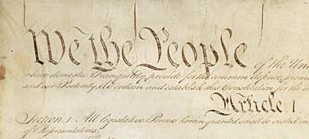Citizenship and Migration in the United States Constitution

The complete Constitution, including images, text, and background, is available through The Charters of Freedom at the National Archives.

The complete Constitution, including images, text, and background, is available through The Charters of Freedom at the National Archives.
Article One [Ratified as part of the original
Constitution in 1788, this article concerns legislative power.]
Section 2
. . . Representatives and direct Taxes shall
be apportioned among the several States which may be included within this
Union, according to their respective Numbers, which shall be determined by
adding to the whole Number of free Persons, including those bound to
Service for a Term of Years, and excluding Indians not taxed, three fifths
of all other Persons. The actual Enumeration shall be made within three
Years after the first Meeting of the Congress of the United States, and
within every subsequent Term of ten Years, in such Manner as they shall by
Law direct. . . .
Section 8
The Congress shall have Power To lay and
collect Taxes, Duties, Imposts and Excises, to pay the Debts and provide
for the common Defence and general Welfare of the United States; but all
Duties, Imposts and Excises shall be uniform throughout the United States
. . .
To establish an uniform Rule of
Naturalization, and uniform Laws on the subject of Bankruptcies throughout
the United States . . .
Section 9
The Migration or Importation of such
Persons as any of the States now existing shall think proper to admit,
shall not be prohibited by the Congress prior to the Year one thousand
eight hundred and eight, but a Tax or duty may be imposed on such
Importation, not exceeding ten dollars for each Person.
Article Four [Ratified as part of the original
Constitution in 1788, this article concerns the power of the states.]
Section 2
The Citizens of each State shall be
entitled to all Privileges and Immunities of Citizens in the several
States.
A Person charged in any
State with Treason, Felony, or other Crime, who shall flee from Justice,
and be found in another State, shall on Demand of the executive Authority
of the State from which he fled, be delivered up, to be removed to the
State having Jurisdiction of the Crime.
No Person held to Service or Labour in one
State, under the Laws thereof, escaping into another, shall, in
Consequence of any Law or Regulation therein, be discharged from such
Service or Labour, but shall be delivered up on Claim of the Party to whom
such Service or Labour may be due.
Article Five [Ratified as part of the original
Constitution in 1788, this article concerns amending the Constitution.]
The Congress, whenever two thirds of both
Houses shall deem it necessary, shall propose Amendments to this
Constitution, or, on the Application of the Legislatures of two thirds of
the several States, shall call a Convention for proposing Amendments,
which, in either Case, shall be valid to all Intents and Purposes, as Part
of this Constitution, when ratified by the Legislatures of three fourths
of the several States, or by Conventions in three fourths thereof, as the
one or the other Mode of Ratification may be proposed by the Congress;
Provided that no Amendment which may be made prior to the Year One
thousand eight hundred and eight shall in any Manner affect the first and
fourth Clauses in the Ninth Section of the first Article; and that no
State, without its Consent, shall be deprived of its equal Suffrage in the
Senate.
Thirteenth Amendment [Ratified in 1865, this
Amendment eliminates paragraph 3 of Article Four, Section 2.]
Section 1
Neither slavery nor involuntary servitude,
except as a punishment for crime whereof the party shall have been duly
convicted, shall exist within the United States, or any place subject to
their jurisdiction.
Fourteenth Amendment [Ratified in
1868, this Amendment modifies Article I, section 2. Note also that the
Twenty-sixth Amendment modifies this one to make eighteen the minimum
age for voting.]
Section 1
All persons born or naturalized in the
United States, and subject to the jurisdiction thereof, are citizens of
the United States and of the State wherein they reside. No State shall
make or enforce any law which shall abridge the privileges or immunities
of citizens of the United States; nor shall any State deprive any person
of life, liberty, or property, without due process of law; nor deny to any
person within its jurisdiction the equal protection of the laws.
Section 2
Representatives shall be apportioned among
the several States according to their respective numbers, counting the
whole number of persons in each State, excluding Indians not taxed. But
when the right to vote at any election for the choice of electors for
President and Vice-President of the United States, Representatives in
Congress, the Executive and Judicial officers of a State, or the members
of the Legislature thereof, is denied to any of the male inhabitants of
such State, being twenty-one years of age, and citizens of the United
States, or in any way abridged, except for participation in rebellion, or
other crime, the basis of representation therein shall be reduced in the
proportion which the number of such male citizens shall bear to the whole
number of male citizens twenty-one years of age in such State.